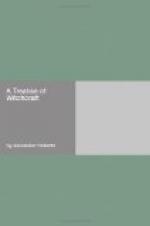[Footnote b: Bud[e,]us de asse. lib. 5.]
[Footnote c: The Ephesians were infamous for their Magicall practises, Appollonius professing the same in the Citie, so that it grewe into a prouerb, +grammata Ephesia+ the Ephesian letters, which were certaine Characters and wordes, by vertue whereof they obtained good successe in all businesse, victory against others, euasion and escape from dangers; and as we reade in Suidas, a Milesian armed with these letters, ouer-came thirty Champions in the games of Olimpus, but being remoued by the Magistrate, hauing intelligence thereof, himselfe was subdued. Of these see Athen[e,]us Deipnosophiston lib. 12. Hesichius in his Lexicon. Plutarchus quaestionum conuiualium, lib 7. cap. 5.]
¶ The eight Proposition, and first consequent.
Now then from this premised narration, these two corrollaries or consequents do necessarily follow.
It is not lawfull for any Christian to consult with a witch or wisard, or goe to them for helpe. God himselfe, whose commandement is and must be the rule of our life & direction hath forbidden it, Leuit. 19. 31. and 20. 6. Deuter. 18. 10.11. And the Imperiall lawes, haue beene in this case verie respectiue.[a] Therefore, Leo the Emperour straitly enioyneth, that none should resort vnto them, and stileth their aduice nothing but meere impostures and deceit; and in the [b]Decrees collected by Gratian, the teachers of the people are seriously exhorted to admonish them, that magicall arts and inchantments cannot heale any infirmity: and that they bee the dangerous snares, and subtilties of that ancient enemy of mankind, by which he indeuoureth to entangle them[c]: and these so streight and seuere prohibitions are not without iust and weighty cause. For,




